Country Director, ActionAid Nigeria, Ene Obi, has stated that Nigerian women deserve a more inclusive government to address the gender gaps in the country.
Obi made this known in an interview with the News Agency of Nigeria (NAN) on Tuesday, August 2, in Abuja.
The ActionAid Director said in spite of the return of democracy for over 20 years, the country had continued to decline in terms of stepping up the push for more women in political leadership.
Read Also: ASUU Reveals No Lecturer Has Been Paid Since Feb
She added that the gender bills, which were meant to correct the imbalance were unfortunately rejected by the National Assembly.
According to Obi, the patriarchal system being operated in the government is really a stumbling block and as such drastic measures must be made to put an end to it.
What we should be saying now is that we are at a point where things need to be done and that was why the gender bills were sent to the National Assembly because we tried to review and reflect on what is done in the other parts of the world.
Look at Rwanda, which is in Africa, there was a deliberate effort to encourage women’s participation in governance.
Look at the issue of Beijing Conference in 1995, it came in when the world leaders agreed that there was lack of representation of women or that it was not sufficient.
Poor Representation In Government
The ActionAid Director further lamented the 30 percent representation of women in government.
So they took the decision that in public life that we must have 30 per cent of women representation. And when we came back to Nigeria, the government of Nigeria did not document it until 2006 when it came out with the National Gender Policy.
That came on board but when it was going on everybody felt like you cannot just give 30 per cent, you should make it 35 per cent and there is lack of that political commitment.
So even with that 35 per cent affirmative action, how have we faired when we are just having about 6.7 per cent representation in appointive and elective position.
We need to do something because of diversity in our representation; we need to correct the imbalance so as to encourage representation of our population, which in turn will lead to quality decisions in our national life.

